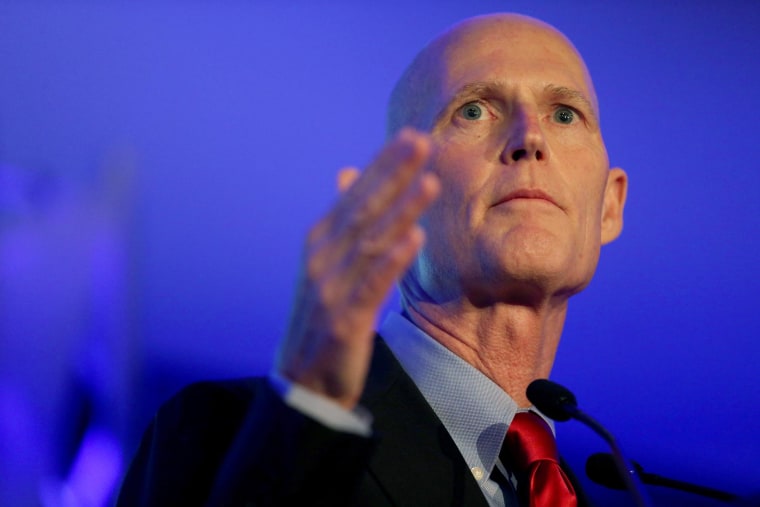In maybe the most overlooked storyline this election season, November could very well result in the most sitting governors – from both parties – losing re-election bids in 20 years.
One has already lost: Hawaii Gov. Neil Abercrombie, who was trounced in the Aloha State’s Democratic primary back in August.
And another 11 find themselves in tough races: Sean Parnell (R-AK), John Hickenlooper (D-CO), Dan Malloy (D-CT), Rick Scott (R-FL), Nathan Deal (R-GA), Pat Quinn (D-IL), Sam Brownback (R-KS), Paul LePage (R-ME), Rick Snyder (R-MI), Tom Corbett (R-PA) and Scott Walker (R-WI).
Twenty years ago, in 1994, was the last time five or more sitting governors lost their re-election races. And since then, no more than three have lost in a single election cycle.
But this fall is shaping up to be one of the most dangerous cycles for governors since 1994 or even 1964 – when a record 11 incumbents lost.
Two reasons help explain why so many governors are vulnerable this election season.
Jennifer Duffy, senior editor of the non-partisan Cook Political Report, said one cause of incumbents’ troubles this election season are self-inflicted wounds.
“Many of these governors have put themselves in this position,” said Duffy. “Gov. Sam Brownback, for example, has doubled down on a series of tax cuts despite their unpopularity.”
Even in a place as friendly to the GOP as Kansas, Gov. Brownback is shown to be trailing Democratic challenger Paul Davis by single digits.
Despite a recent report detailing an unsavory 1998 incident involving Davis and police at a Kansas strip club, Duffy said the poll numbers are not likely to take a major swing back in Gov. Brownback’s direction.
The other reason so many governors are in trouble – there are simply more first-term ones running for re-election this year, according to Nathan Gonzales, deputy editor of The Rothenberg Political Report.
“Voters are getting ready to voice their opinion on the jobs these governors have done in the first years in office,” said Gonzales. “There were many more open seats in 2010, and some of those races had close or surprise winners.”
That is perhaps no more evident than in Connecticut. After winning an electrifying open seat race by only a few thousand votes in 2010 against Republican Tom Foley, Democratic Gov. Dan Malloy is now among one of the most vulnerable officeholders up for re-election.
Despite the Constitution State’s blue hue, a Quinnipiac poll last month found Malloy trailing in a rematch against Foley, 46 percent to 40 percent.
The gubernatorial incumbent in the worst shape though is Pennsylvania Republican Tom Corbett.
Like many of the governors on the hot seat this cycle, Gov. Corbett inherited a lagging state economy. Cuts to education, his response to the Penn State sex abuse scandal, and his brusque, prosecutorial style has made his popularity further wane with voters.
An average of recent polls shows a slumping Corbett trailing Democratic businessman Tom Wolf by more than 15 points.
Corbett isn’t the only Republican battling for his political life.
One-time presidential hopeful Gov. Scott Walker finds himself in a close race after a tumultuous first term in office in Wisconsin.
Walker was nearly ousted during a June 2012 recall election after the collective bargaining agreement he and state legislators pushed through caused headline-making protests.
Despite that effort, Walker garnered 53 percent of vote and survived, but now faces a formidable opponent in former Madison School Board member Mary Burke.
A new Marquette poll showed Walker with a narrow lead, 50 percent to 45 percent.
Yet another Republican, Florida Gov. Rick Scott, is also locked in a tight battle with Republican-turned-independent-turned-Democrat former Gov. Charlie Crist.
Like Corbett, Gov. Scott came into office with a weak state economy. Following the 2008 financial crisis, Florida was hit particularly hard. Ironically, Scott inherited these fiscal difficulties from Crist, and is now touting the Sunshine State’s steps toward recovery as the major selling point for voters to re-elect him.
Most expect the Scott-Crist race to go down to the wire.
